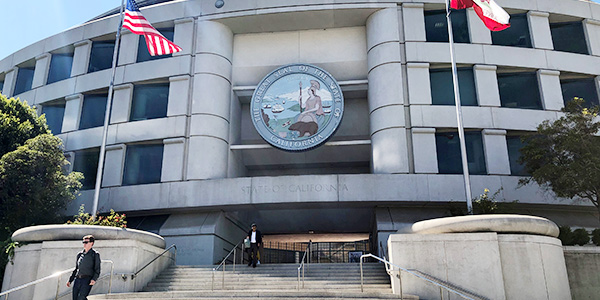By Hudson Sangree
The California Public Utilities Commission opened a formal examination into Pacific Gas and Electric’s Chapter 11 reorganization plan Thursday, as bondholders trying to take over the bankrupt utility upped the ante by offering wildfire victims $6 billion more than the utility has proposed.
The commission voted unanimously for an order instituting investigation (OII) that will consider how PG&E’s plan to emerge from bankruptcy will affect ratepayers. The CPUC must approve any proposed plan for its reorganization.
“The commission is party to the Chapter 11 matter in the bankruptcy court and will continue to represent the interests of California in this matter,” new CPUC President Marybel Batjer said from the dais. “The commission’s focus remains solely on ensuring Northern Californians receive safe and reliable service at reasonable rates and consistent with achieving California’s climate goals.”
Among the CPUC’s considerations are PG&E’s compliance with AB 1054, a new law that lets the state’s investor-owned utilities participate in a $21 billion fund to pay for fire damages. The caveat is that PG&E must satisfy the requirements of AB 1054 and emerge from bankruptcy by June 30, 2020, if it wants to benefit from the state’s insurance-like fund. (See Calif. Lawmakers Rush to Pass Utility Wildfire Aid.)
The deadline has lent new urgency to reorganize the company, which faces billions of dollars in debts from the recent wildfires sparked by its equipment. Those fires included the November 2018 Camp Fire, the deadliest and most destructive in state history, and the Northern California wine country fires of October 2017. The expected liability for the fires drove PG&E to seek bankruptcy protection in January.
The commission said Thursday that the broader scope of its investigation would provide more opportunity for public input than the relatively limited scope of the bankruptcy proceedings.
“As much as we get criticized for being complicated and arcane, we are nothing compared to the bankruptcy court,” Commissioner Liane Randolph said, prompting laughter. “So this really is the opportunity for parties with more diverse interests to participate in a somewhat more publicly accessible process.”
Commissioner Clifford Rechtschaffen noted that the OII was familiar ground for the CPUC, which had to approve PG&E’s bankruptcy reorganization plan following the California energy crisis of 2000/01. He said he was confident the commission could deal with the matter “expeditiously.”
The CPUC will focus on the safety concerns that have plagued PG&E since the San Bruno gas pipeline explosion of 2008, which resulted in the commission’s ongoing investigation into the utility’s safety culture, Rechtschaffen said.
Bondholders Push Harder
Two blocks away from CPUC headquarters in San Francisco, in the U.S. Bankruptcy Court for the Northern District of California, a group of PG&E bondholders increased their offer to fire victims in a reorganization plan they want the court to adopt.
The plan by the Ad Hoc Committee of Senior Unsecured Noteholders would seize control of the utility from its current shareholders. The committee has asked bankruptcy Judge Dennis Montali, for a second time, to end PG&E’s period of exclusivity, the time the company has to offer and solicit support for its own reorganization plan, unhampered by competing proposals. (See Lawyers Clash in PG&E Bankruptcy Hearing.)
A hearing to consider that motion is scheduled for Oct. 7.
In a term sheet filed with the court Wednesday, the bondholders said they would invest $29.2 billion in PG&E in exchange for 59.3% of the company’s common stock. Their terms also require PG&E to pay or recast billions of dollars in unsecured debt, which typically can be refuted in bankruptcy.
The term sheet lists more than $17.5 billion in unsecured notes among PG&E’s debts.
The bondholders, led by hedge fund Elliott Management Corp., recently announced they had the support of fire victims after pledging to fund a trust of $13 billion to pay for wildfire damages. In the term sheet filed Wednesday, they upped that offer to $14.5 billion plus another $11 billion to pay subrogation claims held by insurers and others.
PG&E, in its latest Chapter 11 plan, allotted $8.4 billion for a fire-victim trust, though it could increase that amount.
The utility told Montali that it has about $14 billion in financial commitments from banks and investors to help pay for its bankruptcy plan.
PG&E’s plan also includes $11 billion for subrogation claimants, who are now on the utility’s side. Those claimants include Boston-based Baupost Group, another high-risk investor, that bought up a reported $3.3 billion in subrogation claims from insurance companies. Baupost is a major PG&E shareholder that bought the utility’s stock when it was selling for $30 to $40/share instead of today’s roughly $10/share value.
PG&E’s critics said Baupost bought the insurance claims for pennies on the dollar and is trying to profit from the utility’s $11 billion payment plan, partly to make up for its stock losses.
PG&E asked Montali on Wednesday to extend its window of exclusivity from late November to late January. It filed a document in support of that move from John Boken, managing director of AlixPartners, a firm that’s providing interim management services to PG&E during its bankruptcy.
Boken assured the court in his declaration that the company had made a good-faith effort to move forward with one of the biggest bankruptcies in U.S. history.
Given PG&E’s size and the complexity of its bankruptcy, “I believe the debtors have made significant progress in the administration of these Chapter 11 cases,” Boken told the judge.




